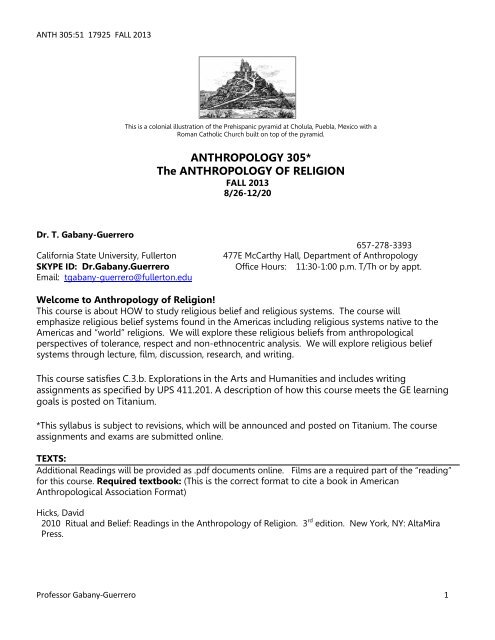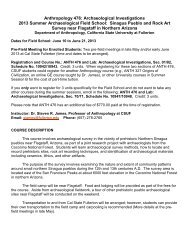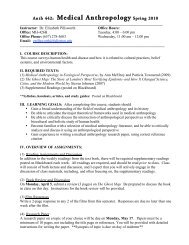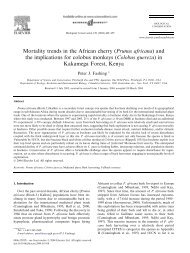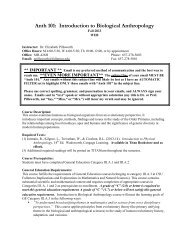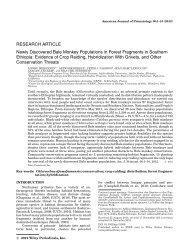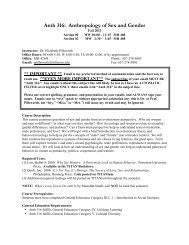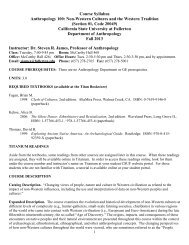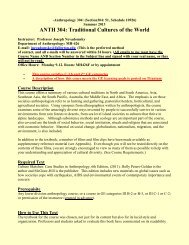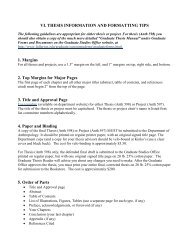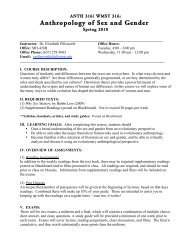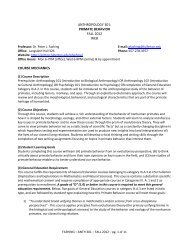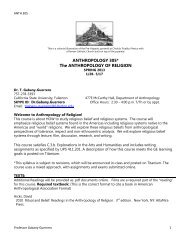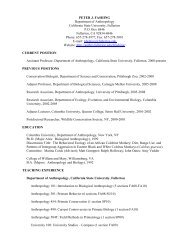anthropology 100 - CSUF Anthropology - California State University ...
anthropology 100 - CSUF Anthropology - California State University ...
anthropology 100 - CSUF Anthropology - California State University ...
Create successful ePaper yourself
Turn your PDF publications into a flip-book with our unique Google optimized e-Paper software.
ANTH 305:51 17925 FALL 2013<br />
This is a colonial illustration of the Prehispanic pyramid at Cholula, Puebla, Mexico with a<br />
Roman Catholic Church built on top of the pyramid.<br />
ANTHROPOLOGY 305*<br />
The ANTHROPOLOGY OF RELIGION<br />
FALL 2013<br />
8/26-12/20<br />
Dr. T. Gabany-Guerrero<br />
657-278-3393<br />
<strong>California</strong> <strong>State</strong> <strong>University</strong>, Fullerton<br />
477E McCarthy Hall, Department of <strong>Anthropology</strong><br />
SKYPE ID: Dr.Gabany.Guerrero Office Hours: 11:30-1:00 p.m. T/Th or by appt.<br />
Email: tgabany-guerrero@fullerton.edu<br />
Welcome to <strong>Anthropology</strong> of Religion!<br />
This course is about HOW to study religious belief and religious systems. The course will<br />
emphasize religious belief systems found in the Americas including religious systems native to the<br />
Americas and “world” religions. We will explore these religious beliefs from anthropological<br />
perspectives of tolerance, respect and non-ethnocentric analysis. We will explore religious belief<br />
systems through lecture, film, discussion, research, and writing.<br />
This course satisfies C.3.b. Explorations in the Arts and Humanities and includes writing<br />
assignments as specified by UPS 411.201. A description of how this course meets the GE learning<br />
goals is posted on Titanium.<br />
*This syllabus is subject to revisions, which will be announced and posted on Titanium. The course<br />
assignments and exams are submitted online.<br />
TEXTS:<br />
Additional Readings will be provided as .pdf documents online. Films are a required part of the “reading”<br />
for this course. Required textbook: (This is the correct format to cite a book in American<br />
Anthropological Association Format)<br />
Hicks, David<br />
2010 Ritual and Belief: Readings in the <strong>Anthropology</strong> of Religion. 3 rd edition. New York, NY: AltaMira<br />
Press.<br />
Professor Gabany-Guerrero 1
ANTH 305:51 17925 FALL 2013<br />
Office Hours and Communication<br />
Note: The best way to reach me is through email.<br />
• All emails must have Anth 325 in the Subject line; please sign with your real name.<br />
PUT your LAST NAME in the DOCUMENT NAME for all assignments OR documents you submit AND MAKE sure<br />
that your name is at the top of each assignment document you submit.<br />
COURTESY and RESPECT: Be respectful and courteous with the professor and your colleagues.<br />
Office hours and communication will not be available on the following university holidays: Monday,<br />
September 2nd, Labor Day - Monday, November 11 th , Veterans’ Day - Saturday – Sunday, November 25 th –<br />
December 1 st .<br />
In addition, as a professor at <strong>CSUF</strong>, it is part of my responsibility to attend professional conferences to<br />
present research. I will be attending the national annual meeting of the American Anthropological<br />
Association from 11/20-24.<br />
QUESTIONS ABOUT (Titanium) MOODLE:<br />
• In order to be successful in this course you MUST complete the student tutorials about<br />
how to use Titanium before beginning the course. See the ORIENTATION Module at the<br />
beginning of the course.<br />
• Titanium technical questions and problems should be directed to OASIS at 657-278-<br />
4866 M-F from 8 a.m. to 2 a.m. (yes, 2:00 a.m.!), or email oasis@fullerton.edu or call IT at<br />
(657) 278-7777 OR helpdesk@fullerton.edu. Technical questions are questions like: “I can’t<br />
view the videos, can someone help me with this?” or “I am not able to view or complete<br />
assignments or quizzes, how do I do that?” or “My computer won’t play the video, how can<br />
I fix that?”<br />
• In the event of technical problems that delay your submission of an assignment, report<br />
the technical problem to the HELP DESK AND send me an email. The HELP DESK will<br />
verify that TITANIUM was unavailable during the submission period.<br />
COURSE REQUIREMENTS AND GRADING:<br />
Orientation Exercises 10<br />
8 QUIZZES (@ 50 points) – includes final 400<br />
Bibliography Assignment 20<br />
Classroom Discussion (2 @20 points) 40<br />
Film Critique about Religion 50<br />
TOTAL 520<br />
Grading Scale:<br />
98-<strong>100</strong> % A+ 95-97 % A 90-94 % A-<br />
88-89 % B+ 84-87 % B 80-83 % B-<br />
78-79 % C+ 74-77 % C 70-73 % C-<br />
68-69 % D+ 56-67 % D 50-55 % D-<br />
Professor Gabany-Guerrero 2
ANTH 305:51 17925 FALL 2013<br />
0-49 % F<br />
LATE POLICIES:<br />
All Assignments will be posted on TITANIUM under the Week in which they are due. Work is<br />
considered late if emailed after midnight on the date due. I will deduct 5 points off per day or<br />
partial day late.<br />
QUIZZES or EXAMS:<br />
The quizzes will consist of objective questions (e.g. multiple-choice) which may cover films,<br />
readings and lectures.<br />
Make-up exams will be given only in emergency medical situations. A physician’s note must be<br />
provided to the professor, and you should contact the professor before the scheduled exam if<br />
possible. Make-up exams are NOT automatically allowed. Notify the professor in advance of the<br />
exam if you cannot take the exam at the scheduled time. Make-up exams will be allowed only<br />
for verifiable and unavoidable reasons like hospitalization of yourself or a family member<br />
or an accident. If allowed, a make-up exam must be taken within one week of the scheduled test<br />
date. Grading: See the chart above.<br />
SPECIAL NEEDS:<br />
• During the first week of classes, inform me of any disabilities or special needs that you have that may<br />
require special arrangements related to attending class sessions, carrying out writing assignments, or taking<br />
examinations.<br />
• Students with disabilities must document the disability at the Office of Disability Support Services in<br />
UH 101, call (657) 278-3117 and communicate via the web http://www.fullerton.edu/DSS/<br />
CITATION FORMAT<br />
Please take note that all papers and assi gnments require that you use the Anthropological citation<br />
format from the American Anthropological Association (www.aaanet.org). The AAA guide is provided as a<br />
.pdf document for you. <strong>University</strong> students should be familiar with how to use ENDNOTE, a free<br />
bibliography software that is available to you through the Pollak Library portal. This online software<br />
program will assist you with collecting your bibliographic sources AND formatting them in AAA format.<br />
This is a requirement for your paper.<br />
• Click on the LIBRARY REFERENCE RESOURCES module in Titanium. A tutorial is provided<br />
for you about how to access the <strong>anthropology</strong> databases at Pollak Library and a second<br />
tutorial is available about how to use ENDNOTE.<br />
• Do not email the professor about how to use ENDNOTE – CONTACT THE LIBRARY – they<br />
have 24-7 chat access.<br />
You are responsible for reading the information and applying the guidelines to ALL written assignments for<br />
the class. Points will be deducted for incorrect citation format.<br />
Professor Gabany-Guerrero 3
ANTH 305:51 17925 FALL 2013<br />
Academic Integrity:<br />
Students who violate university standards of academic integrity are subject to disciplinary<br />
sanctions, including failure in the course and suspension from the university. Familiarize<br />
yourself with the academic dishonesty policy in the current student handbook or at<br />
http://fullerton.edu.senate/PDF/300/UPS300021.pdf<br />
Violations of the <strong>University</strong>’s Academic Misconduct policies will not be tolerated. Studying and<br />
working together is encouraged, but all written assignments MUST BE YOUR OWN WORK. Dishonesty<br />
includes, but is not limited to, cheating, plagiarizing, fabricating information or citations, facilitating<br />
acts of academic dishonesty by others, having unauthorized possession of examinations, submitting<br />
work of another person or work previously used without informing the instructor, or tampering with<br />
the academic work of other students. Fabrication of research data and/or plagiarism will result in a<br />
grade of “0” for the assignment and will be reported to Judicial Affairs. I highly recommend that<br />
you consult the guide on how to avoid plagiarism, which can be accessed at<br />
http://www.fullerton.edu/deanofstudents/judicial/Plagiarism.htm.<br />
CLASS SCHEDULE<br />
• Assigned reading should be done by early in the week, so that you are prepared to<br />
complete the assignments<br />
• Each week has several topics, readings and assignments. Films are interspersed throughout the<br />
semester and film questions will be completed as part of online submissions.<br />
• Make sure that you have read the entire syllabus and understand all of the requirements<br />
for the course. A syllabus is a guide for the semester. If any changes are necessary you will be<br />
notified that a change to the syllabus has been posted.<br />
• Modules will be posted one week in advance, but you have the entire course syllabus and should<br />
prepare based on the syllabus schedule.<br />
• R&B refers to the Ritual and Belief textbook<br />
• Each week you are expected to view the online activities listed under Titanium for that week. There<br />
may be audio powerpoint lectures or specific learning activities for you to complete.<br />
Professor Gabany-Guerrero 4
ANTH 305:51 17925 FALL 2013<br />
ORIENTATION<br />
Each module contains exercises.<br />
Week 1:<br />
By the end of the Orientation you will be able to:<br />
• Identify the key objectives of the course<br />
• Navigate and Complete assignments using Titanium<br />
• Create a Course Notebook<br />
View and take notes on the films:<br />
1. Ethnocentrism Video<br />
2. Race: Are We So Different?<br />
1. During each film you should be taking notes. To practice this<br />
process, answer the questions on the “Race: Are We So<br />
Different” Film Worksheet. You do not need to submit the<br />
answers, but answering the questions will prepare you for your first<br />
quiz.<br />
Assignments:<br />
Read the Syllabus<br />
Make sure that you have read, in detail, the policy with respect to academic honesty,<br />
understand communication, submission and late policies, and the requirements for<br />
writing, in-text citations and bibliography.<br />
Orientation Activities: Open and read all items in the folders provided for you.<br />
There is a place for you to check-off completion in the Module. Grading is not<br />
automatic for this exercise. Expect your 10 points, two to three weeks after you<br />
complete the assignment.<br />
• Complete Titanium Tutorials: Links are provided for you. Double-check that your computer<br />
settings are correct and you have all the required free programs downloaded and installed so that<br />
you can view and complete the assignments. Contact OASIS if you are having technical problems.<br />
(See note above on “Questions about Titanium.”). As you complete each orientation item, you can<br />
“check off” the item in Titanium. This is how I will know that you have completed the Orientation<br />
exercises for 10 points.<br />
• Create your Course Notebook. I highly recommend that you create a course notebook that<br />
follows the format provided for you in the Orientation (see online Course Notebook file).<br />
Online student learning benefits greatly from creating the notebook and using the “Cornell<br />
Method of Notetaking” (see online information provided for you.<br />
• Take the online survey. A link will be emailed to you during the first week of classes.<br />
All of the steps above must be completed by Tuesday, September 3rd.<br />
Professor Gabany-Guerrero 5
ANTH 305:51 17925 FALL 2013<br />
MODULE 1<br />
By the end of Module 1 you will be able to:<br />
• Identify the key components of the discipline of <strong>anthropology</strong><br />
• Identify key terms in cultural <strong>anthropology</strong><br />
• Apply the anthropological definitions of race and ethnicity<br />
• Understand and apply the concepts of ethnocentrism, worldview and cultural relativism throughout this course<br />
• Identify and eliminate ethnocentric language in your own writing and communication<br />
Week 2: Introduction to Cultural <strong>Anthropology</strong><br />
Readings:<br />
Videos:<br />
Assignments:<br />
1. Chapter 1 and Chapter 2: “Cultural <strong>Anthropology</strong>” by Kottak (on-line<br />
readings)<br />
2. “Race without Color” by Diamond (on-line reading)<br />
3. “Official <strong>State</strong>ment on Race” by The American Anthropological Association<br />
(on-line reading)<br />
1. Introduction to <strong>Anthropology</strong> - Faces of Culture<br />
2. Discussion group assignments will be made during this week.<br />
Introduce yourself to your colleagues.<br />
For the first graded discussion, review the discussion rubric<br />
which requires two postings, one original and one response to<br />
a colleague. Citations are required (from your textbook and<br />
readings) in your original response. Spelling and grammar do<br />
count, so I suggest that you write your response in WORD,<br />
correct the problems and then copy and paste the responses<br />
into the Discussion Forum. Postings earlier in the week count<br />
for more credit than last minute (day it is due) postings.<br />
3. Complete Multiple Choice Quiz #1 on readings and films. - due<br />
Monday, 9/9 before 11:55 p.m. Each Quiz is worth 50 points. The<br />
quizzes only permit you to navigate forward; you cannot return to a<br />
previous question.<br />
Professor Gabany-Guerrero 6
ANTH 305:51 17925 FALL 2013<br />
MODULE 2<br />
By the end of Module 2 you will be able to:<br />
•Define key anthropological approaches to religion.<br />
•Apply terms from <strong>anthropology</strong> of religion<br />
•Identify specific historical perspectives in the analysis of religion (Tylor, Freud, Durkheim)<br />
•Conduct a library search for an <strong>anthropology</strong> article about an <strong>anthropology</strong> of religion topic using <strong>Anthropology</strong><br />
Plus database and save the search using ENDNOTE Web.<br />
•Understand and apply the <strong>anthropology</strong> (AAA) citation format to create a bibliography.<br />
Week 4<br />
Readings:<br />
Assignments:<br />
1. Chapter 3: “Religion” by Kottak (on-line reading)<br />
2. Perspectives: Readings Introduction, 1-1 and 1-3 in R&B (textbook)<br />
1. Complete the library tutorial video by Tuesday, 9/17. Contact Dr.<br />
Tschabrun (email: stschabrun@fullerton.edu) at the Pollak Library if you<br />
have questions about how to conduct the library research.<br />
2. This quiz is heavily focused on mastery of the terminology and<br />
specific scholars’ perspectives about the <strong>anthropology</strong> of religion.<br />
Complete Multiple Choice Quiz #2 on readings. - due, 9/23.<br />
Each Quiz is worth 50 points.<br />
3. Select a film from the film critique assignment of interest to you<br />
(Example: Buddhist rituals). The bibliographic research for this<br />
assignment can help you to build your research for the Film Critique.<br />
Follow the instructions and select two <strong>anthropology</strong> articles from the<br />
<strong>Anthropology</strong> Plus database searching under the keywords that you<br />
selected. You must include at least one source for the culture selected<br />
and a second source should be about the event or ritual covered in the<br />
film. No internet general sources or encyclopedias (Wikipedia) will be<br />
accepted.<br />
Create two (2) bibliographic entries in AAA format. If you have<br />
created your notebook, then use the last section to begin this<br />
assignment. Thi s assi gnment takes ti me and care. Follow the<br />
tutorials provided for you and contact the LIBRARIAN at least three<br />
days before the assignment is due if you have questions. Submit via<br />
Titanium -- due Monday, 10/14 th by 11:55 p.m.<br />
Professor Gabany-Guerrero 7
ANTH 305:51 17925 FALL 2013<br />
MODULE 3<br />
By the end of Module 3 you will be able to:<br />
•Recognize the key components of myths and monomyths across cultures.<br />
•Apply the concept of “worldview” to the study of myths<br />
•Understand different approaches to the study of myths<br />
•Analyze the features that myths share cross-culturally and the specific differences that may occur in several cultural<br />
examples<br />
•Understand and apply the <strong>anthropology</strong> (AAA) citation format for written assignments.<br />
Weeks 5-6<br />
Readings:<br />
1. Myth, Cosmology and Symbolic Classification: Readings 2-1, 2-2, and 2-3 in<br />
R&B (textbook)<br />
2. “Gilgamesh” from Hero Myths<br />
Video:<br />
Assignments:<br />
The Power of Myth by Joseph Campbell<br />
1. Reading Discussion #1: Discuss how the reading “Gilgamesh”<br />
meets at least two of the requirements for a “hero.” See the<br />
grading rubric for discussion postings. 20 points.<br />
Original post due by Due 9/30. First responses to<br />
colleagues are due 10/2. Final posts are due 10/4.<br />
2. Complete Multiple Choice Quiz #3 - due Monday, 10/7. Each<br />
Quiz is worth 50 points.<br />
Professor Gabany-Guerrero 8
ANTH 305:51 17925 FALL 2013<br />
MODULE 4<br />
By the end of Module 4 you will be able to:<br />
Week 7<br />
•Recognize the importance of symbols in religious belief systems<br />
•Understand the ways that symbols can be interpreted across cultures<br />
•Recognize alternative ways of conceptualizing time and sacredness<br />
•Recognize the key components of ritual<br />
•Identify different types of rituals and rites of passage<br />
Readings:<br />
Video:<br />
Assignments:<br />
1. Ritual: Readings 4-1, 4-2, and 4-3 in R&B (textbook)<br />
The Popol Vuh, (Click on the link to view) by Patricia Amlin, 62 minutes. Optional<br />
link to the text of the Popol Vuh (English, Spanish and Quiché).<br />
The Rise and Fall of a Civilization is a new National Geographic film that<br />
is not required, but may help you to understand the context of the Maya<br />
civilization.<br />
1. Film Critique Assignment: Select a film from the list to view. View<br />
the film and take detailed observation notes. Follow the review<br />
format for the assignment (exactly with the subheadings indicated).<br />
Include two academic <strong>anthropology</strong> references about the ritual in<br />
your review. Due Monday 11/18 before 11:55 p.m. 50 points.<br />
2. Complete Multiple Choice Quiz #4 – due Monday, 10/28.<br />
Each Quiz is worth 50 points.<br />
Professor Gabany-Guerrero 9
ANTH 305:51 17925 FALL 2013<br />
MODULE 5<br />
By the end of Module 5 you will be able to:<br />
Week 8<br />
•Recognize the characteristics of altered states of consciousness<br />
•Recognize how altered states of consciousness relate to religious experience<br />
•Observe and interpret specific examples of altered states of consciousness such as The Holy Ghost<br />
People<br />
•Recognize the key components of magic<br />
•Identify different approaches to the study of magic<br />
•Recognize the ways that magic and divination can be studied<br />
Readings:<br />
Video:<br />
Assignments:<br />
Magic & Witchcraft: Readings 7-1, 7-2, and 7-3 in R&B (textbook)<br />
Daugherty, “Serpent-Handling as Sacrament” ADDITONAL ONLINE<br />
READING<br />
The Holy Ghost People by Peter Adair<br />
Reminder Bibliography Assignment Due<br />
MODULE 6<br />
By the end of Module 6 you will be able to:<br />
Week 9<br />
• Describe the structure of a rite of passage.<br />
• Explain the concept of liminality.<br />
• Explain why body modification is a common element of a rite of passage.<br />
• Explain the importance of rituals in the domain of religion, including how they relate to the<br />
previously discussed concepts of worldview, myth and symbol.<br />
Readings:<br />
Video:<br />
Practitioners of Ritual: Readings 5-1, 5-2, and 5-3 in R&B (textbook)<br />
Taki Kudo, Shamanic Medium of Tsugaru<br />
Professor Gabany-Guerrero 10
ANTH 305:51 17925 FALL 2013<br />
MODULE 7<br />
By the end of Module 7 you will be able to:<br />
• Recognize the ways that death is conceptualized across cultures<br />
• Compare and contrast specific examples of practices and beliefs regarding death and afterlife.<br />
Weeks 10 -11<br />
Readings:<br />
Videos:<br />
Death: Readings 8-1, 8-2, and 8-3 in R&B (textbook)<br />
AND Body and Mind: Reading 6-2 in R&B<br />
The Tibetan Book of the Dead<br />
Assignments<br />
1. Reading Discussion#2: Discuss how The Tibetan Book of the Dead<br />
explains the death experience. How does this belief system relate<br />
to the symbols discussed by Reading 8-2? 20 points, 11/4<br />
Original Post Due, 11/6 First Response to Colleague Due,<br />
11/8 Final Responses Due.<br />
2. Complete Multiple Choice Quiz #5 – due Tuesday, 11/12.<br />
Each Quiz is worth 50 points.<br />
Professor Gabany-Guerrero 11
ANTH 305:51 17925 FALL 2013<br />
MODULE 8<br />
By the end of Module 8 you will be able to:<br />
• Define gods and spirits and describe the characteristics of each.<br />
• Describe the characteristics of ancestor worship<br />
• Explain the meaning of the anthropomorphism in belief systems<br />
• Explain the differences between ghosts, vampires, and zombies, etc.<br />
Weeks 12-13: Veteran’s Day Reminder<br />
Readings:<br />
Videos:<br />
Gods, Spirits and Souls: Readings 3-1, 3-2, and 3-3 in R&B (textbook)<br />
Teotihuacan: City of the Gods<br />
Assignments<br />
1. Complete Multiple Choice Quiz #6 - due Monday,12/2. Each Quiz is<br />
worth 50 points.<br />
Week 14 Fall Recess!<br />
MODULE 9<br />
By the end of Module 9 you will be able to:<br />
Week 15<br />
• Explain the roles of gender and sexuality in religious practices<br />
• Compare and Contrast gender roles<br />
• Recognize the specific history of European and New England witchcraft examples<br />
• Outline the origins and basic beliefs of the Wicca religion<br />
Readings:<br />
Videos:<br />
Gender and Sexuality: Readings 9-1, 9-2, and 9-3 in R&B (textbook)<br />
AND Body and Mind: Reading 6-3 in R& B<br />
The Burning Times<br />
Professor Gabany-Guerrero 12
ANTH 305:51 17925 FALL 2013<br />
MODULE 10<br />
By the end of Module 10 you will be able to:<br />
• Explain what a revitalization movement is and under what circumstances one is<br />
likely to occur.<br />
• Describe the stages of a revitalization movement.<br />
• Identify the types of revitalization movements and provide an example of each.<br />
Week 16<br />
Readings:<br />
Videos:<br />
Assignments<br />
Agents of Change: Readings 11-1, 11-2, and 11-3 in R&B (textbook)<br />
Ghost Dance Religion<br />
1. Complete Multiple Choice Quiz #7– due Monday, 12/9. Each Quiz is<br />
worth 50 points.<br />
MODULE 11<br />
• Back to the Future: How can ethnohistorical research illuminate religious<br />
studies?<br />
• Case study comparisons between Christianity, Buddhism and Islam<br />
Readings:<br />
Selected pages from<br />
Johnson, Donald and Jean Elliot Johnson<br />
2007 Universal Religions in World History: The Spread of Buddhism,<br />
Christianity and Islam to 1500. New York, NY: McGraw-Hill.<br />
Assignments<br />
Videos: The Buddha:the story of Siddhartha (2010) The Kingdom of Heaven, A<br />
History of Christianity<br />
Worksheet/Study Sheets should be completed on your<br />
own for each film to prepare for the final exam<br />
FINAL EXAM will cover Module 11<br />
Professor Gabany-Guerrero 13
ANTH 305:51 17925 FALL 2013<br />
Background Course Information for <strong>Anthropology</strong> of Religion 305<br />
COURSE DESCRIPTION: “Prerequisite: completion of General Education Category III.B.2. Beliefs and<br />
practices in the full human variation of religious phenomena, with an emphasis on primitive religions.<br />
The forms, functions, structures, symbolism, and history and evolution of religious systems.”<br />
This class is about the varieties of religious practices, symbolism and beliefs studied through the lens<br />
of <strong>anthropology</strong>. Cross-cultural techniques in <strong>anthropology</strong> provide tools to study the religious<br />
practices and beliefs from a wide variety of human experience. The course includes theory, approaches<br />
to the study of religion, and examines the diversity of religious practice and experience throughout<br />
history. Readings and discussion will include myth, ritual, symbols, shamans, native revitalization and<br />
millennialism. The course will take a geographical approach using examples from many cultures and<br />
focus a bit more on examples from the Americas. The learning experience will incorporate lectures,<br />
film, personal or field experience, group presentation, the internet and library research. As this course<br />
works to develop skills in analysis of religious belief and practice, religious activities will be viewed as<br />
forms of social and cultural expression within the context of history and culture. Utilizing a nonethnocentric<br />
approach, the course will explore the varieties of religious belief and experience in the<br />
spirit of respect, free inquiry and critical thinking.<br />
General Education:<br />
This course has the objective of improving your reading, writing, listening and interaction skills in<br />
concert with the university’s General Education goals for “Implications, Explorations, and Participatory<br />
Experience in the Arts and Humanities.” It also fulfills the Cultural Diversity requirement. The<br />
following comes from the <strong>University</strong> Catalog:<br />
Courses in III. B. 3. Implications, Explorations, and Participatory Experience in the<br />
Arts and Humanities include the following goals for student learning:<br />
1. To understand broad, unifying themes in the arts and/or humanities from cross-disciplinary<br />
perspectives.<br />
2. To solve complex problems that require artistic or humanistic understanding.<br />
3. To relate the arts and/or humanities to significant social problems or to other related disciplines.<br />
4. When deemed appropriate, to apply disciplinary concepts<br />
from the arts and/or humanities in a variety of settings, such<br />
as community-based learning sites and activities. Cultural<br />
diversity goals are:<br />
1. To understand that culture is socially constructed and fundamental to social interaction.<br />
2. To appreciate the complex relationships that gender, ethnicity and class bring to a discussion of<br />
society and culture.<br />
3. To understand that because we live in an inter-connected world, we need to understand the<br />
diversity and relationships within and among cultures.<br />
4. To recognize and evaluate how one's cultural history affects one's sense of self and relationship to<br />
others.<br />
Students will ideally master the following specific course objectives in ANTH 305:<br />
1. Understand and appreciate the concept of culture, from the perspective of anthropologists,<br />
as anadaptive mechanism that provides for survival of the human species.<br />
2. Identify similarities that unite the human species and variations in human cultures.<br />
3. Recognize and appreciate that there are a wide variety of “cultural solutions” to living on<br />
Earth.<br />
4. Analyze the specific relationships between culture, the individual and history.<br />
Professor Gabany-Guerrero 14
ANTH 305:51 17925 FALL 2013<br />
5. Recognize theoretical approaches to studying religious experience.<br />
6. Learn and apply the meanings of the basic concepts and terms used by cultural<br />
anthropologists.<br />
7. Apply some of the procedures used by anthropologists in studying cultures and religion.<br />
(Adapted from Faces of Culture Study Guide, 1999)<br />
Professor Gabany-Guerrero 15


